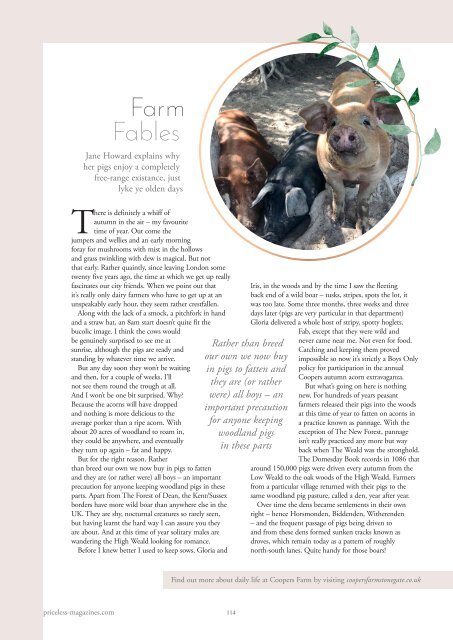Wealden Times | WT257 | October 2023 | Interiors & Bathrooms Supplement inside
The lifestyle magazine for Kent & Sussex - Inspirational Interiors, Fabulous Fashion, Delicious Dishes
The lifestyle magazine for Kent & Sussex - Inspirational Interiors, Fabulous Fashion, Delicious Dishes
You also want an ePaper? Increase the reach of your titles
YUMPU automatically turns print PDFs into web optimized ePapers that Google loves.
Jane Howard explains why<br />
her pigs enjoy a completely<br />
free-range existance, just<br />
lyke ye olden days<br />
There is definitely a whiff of<br />
autumn in the air – my favourite<br />
time of year. Out come the<br />
jumpers and wellies and an early morning<br />
foray for mushrooms with mist in the hollows<br />
and grass twinkling with dew is magical. But not<br />
that early. Rather quaintly, since leaving London some<br />
twenty five years ago, the time at which we get up really<br />
fascinates our city friends. When we point out that<br />
it’s really only dairy farmers who have to get up at an<br />
unspeakably early hour, they seem rather crestfallen.<br />
Along with the lack of a smock, a pitchfork in hand<br />
and a straw hat, an 8am start doesn’t quite fit the<br />
bucolic image. I think the cows would<br />
be genuinely surprised to see me at<br />
sunrise, although the pigs are ready and<br />
standing by whatever time we arrive.<br />
But any day soon they won’t be waiting<br />
and then, for a couple of weeks, I’ll<br />
not see them round the trough at all.<br />
And I won’t be one bit surprised. Why?<br />
Because the acorns will have dropped<br />
and nothing is more delicious to the<br />
average porker than a ripe acorn. With<br />
about 20 acres of woodland to roam in,<br />
they could be anywhere, and eventually<br />
they turn up again – fat and happy.<br />
But for the right reason. Rather<br />
than breed our own we now buy in pigs to fatten<br />
and they are (or rather were) all boys – an important<br />
precaution for anyone keeping woodland pigs in these<br />
parts. Apart from The Forest of Dean, the Kent/Sussex<br />
borders have more wild boar than anywhere else in the<br />
UK. They are shy, nocturnal creatures so rarely seen,<br />
but having learnt the hard way I can assure you they<br />
are about. And at this time of year solitary males are<br />
wandering the High Weald looking for romance.<br />
Before I knew better I used to keep sows, Gloria and<br />
Rather than breed<br />
our own we now buy<br />
in pigs to fatten and<br />
they are (or rather<br />
were) all boys – an<br />
important precaution<br />
for anyone keeping<br />
woodland pigs<br />
in these parts<br />
Iris, in the woods and by the time I saw the fleeting<br />
back end of a wild boar – tusks, stripes, spots the lot, it<br />
was too late. Some three months, three weeks and three<br />
days later (pigs are very particular in that department)<br />
Gloria delivered a whole host of stripy, spotty hoglets.<br />
Fab, except that they were wild and<br />
never came near me. Not even for food.<br />
Catching and keeping them proved<br />
impossible so now it’s strictly a Boys Only<br />
policy for participation in the annual<br />
Coopers autumn acorn extravaganza.<br />
But what’s going on here is nothing<br />
new. For hundreds of years peasant<br />
farmers released their pigs into the woods<br />
at this time of year to fatten on acorns in<br />
a practice known as pannage. With the<br />
exception of The New Forest, pannage<br />
isn’t really practiced any more but way<br />
back when The Weald was the stronghold.<br />
The Domesday Book records in 1086 that<br />
around 150,000 pigs were driven every autumn from the<br />
Low Weald to the oak woods of the High Weald. Farmers<br />
from a particular village returned with their pigs to the<br />
same woodland pig pasture, called a den, year after year.<br />
Over time the dens became settlements in their own<br />
right – hence Horsmonden, Biddenden, Witherenden<br />
– and the frequent passage of pigs being driven to<br />
and from these dens formed sunken tracks known as<br />
droves, which remain today as a pattern of roughly<br />
north-south lanes. Quite handy for those boars!<br />
Find out more about daily life at Coopers Farm by visiting coopersfarmstonegate.co.uk<br />
priceless-magazines.com 114


















